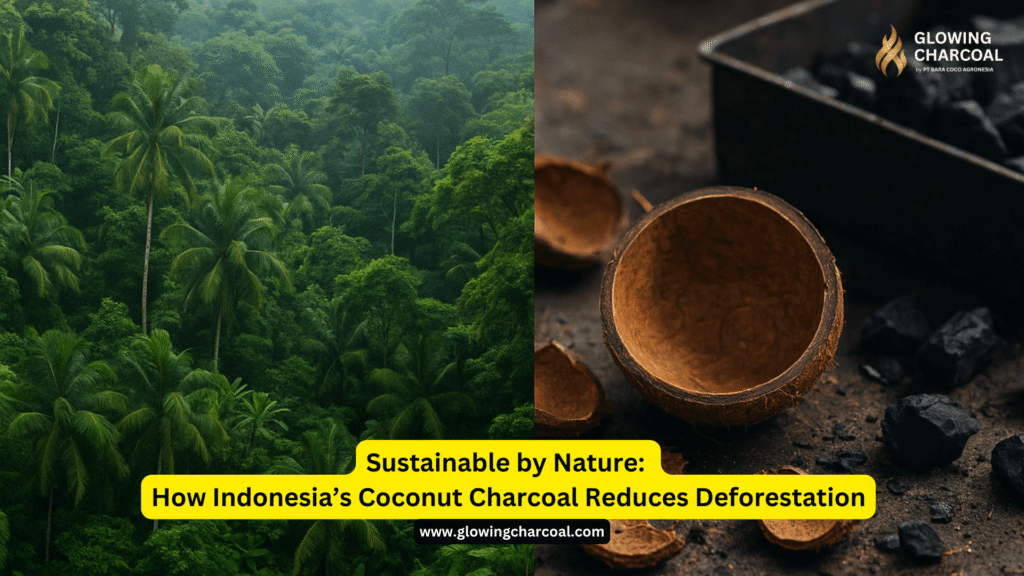Sustainable by Nature: How Indonesia’s Coconut Charcoal Reduces Deforestation

Introduction: A Greener Way to Burn
Indonesia is home to lush rainforests and rich biodiversity — yet it also faces one of the world’s highest rates of deforestation. For decades, traditional charcoal made from hardwood trees has contributed to forest loss, soil degradation, and carbon emissions.
But a quiet revolution is happening. Across the islands, a new, sustainable source of charcoal is rising — coconut shell charcoal. What once was agricultural waste has become a renewable, eco-friendly alternative that protects forests and provides economic opportunity.
At Glowing Charcoal Indonesia, sustainability isn’t just a goal — it’s the foundation of everything we produce.
Coconut Charcoal: A Natural Byproduct of Agriculture
Unlike traditional wood charcoal, which relies on cutting down trees, coconut charcoal comes from coconut shells — a renewable byproduct of the coconut industry.
Every year, Indonesia produces billions of coconuts for food, oil, and cosmetics. The shells, often discarded or burned as waste, can instead be transformed into clean-burning charcoal.
By using these shells, the coconut charcoal industry:
Prevents agricultural waste from polluting the environment
Reduces reliance on hardwood and the need for tree cutting
Creates value from materials that would otherwise be thrown away
In other words, coconut charcoal doesn’t just reduce deforestation — it turns waste into wealth.
How Coconut Charcoal Protects Forests
The traditional charcoal industry depends heavily on timber from natural forests. Every ton of wood charcoal can require several trees to be cut down. Over time, this contributes to soil erosion, loss of biodiversity, and increased CO₂ emissions.
Coconut charcoal offers a closed-loop, tree-free solution.
1. No Trees Are Cut
Coconut trees continuously produce fruit throughout their lifespan (up to 80 years). The shells used for charcoal come from coconuts already harvested for other uses — not from felling trees.
2. Lower Carbon Footprint
Coconut shell charcoal emits far less CO₂ compared to wood charcoal during production. It’s also cleaner-burning, releasing less smoke and particulate matter during use.
3. Sustainable Rural Livelihoods
By turning agricultural waste into energy, farmers and local communities gain new sources of income — reducing economic pressure to clear forests for farmland or timber sales.
4. Long-Term Environmental Balance
Coconut palms are renewable crops that regenerate naturally, making the charcoal supply chain sustainable without harming the ecosystem.
This cycle of reuse is a perfect model of circular economy — one where nature gives, and nothing is wasted.
A Circular Solution for a Linear Problem
Most wood-based charcoal production follows a linear model — cut, burn, and discard. Coconut charcoal, by contrast, fits a circular model of sustainability:
Coconuts are harvested for food and oil.
Shells are collected instead of discarded.
Charcoal is produced from waste shells.
Ash residues can even be returned to the soil as fertilizer.
This system minimizes waste, reduces carbon emissions, and creates long-term economic benefits for Indonesia’s agricultural communities.
The Role of Indonesian Coconut Charcoal in Global Sustainability
As the world seeks cleaner and renewable energy sources, Indonesia’s coconut charcoal industry stands at the forefront of sustainable fuel innovation.
Countries in Europe, the Middle East, and Asia are increasingly shifting from wood charcoal to coconut-based alternatives — not only for environmental reasons, but also for superior performance.
Coconut charcoal burns longer, produces less ash, and delivers consistent heat — ideal for shisha and BBQ applications. The result: a premium product that’s both high-performing and environmentally responsible.
At Glowing Charcoal Indonesia, we take pride in leading this transition. Our factories source 100% natural coconut shells and maintain strict environmental standards throughout the production process.
Why Eco-Conscious Buyers Prefer Coconut Charcoal
Modern consumers are more informed and selective than ever. They want quality products — but they also care about the story behind them.
Coconut charcoal delivers on both fronts:
Eco-Friendly – No trees are cut, and emissions are minimal.
Sustainable Supply – Coconuts grow abundantly across Indonesia.
Ethically Produced – Provides stable income for farmers and workers.
Premium Quality – Burns longer, cleaner, and hotter than wood charcoal.
By choosing coconut charcoal, buyers contribute directly to forest conservation and sustainable development.
Conclusion: A Fire That Protects Forests
Deforestation may be one of Indonesia’s greatest environmental challenges — but innovation is turning the tide.
Through sustainable production, renewable materials, and ethical sourcing, coconut charcoal offers a future where energy no longer comes at nature’s expense.
At Glowing Charcoal Indonesia, every briquette we produce tells a story — not just of heat and performance, but of protection, regeneration, and respect for the planet.
Because real sustainability doesn’t destroy forests — it preserves them, one coconut shell at a time.
